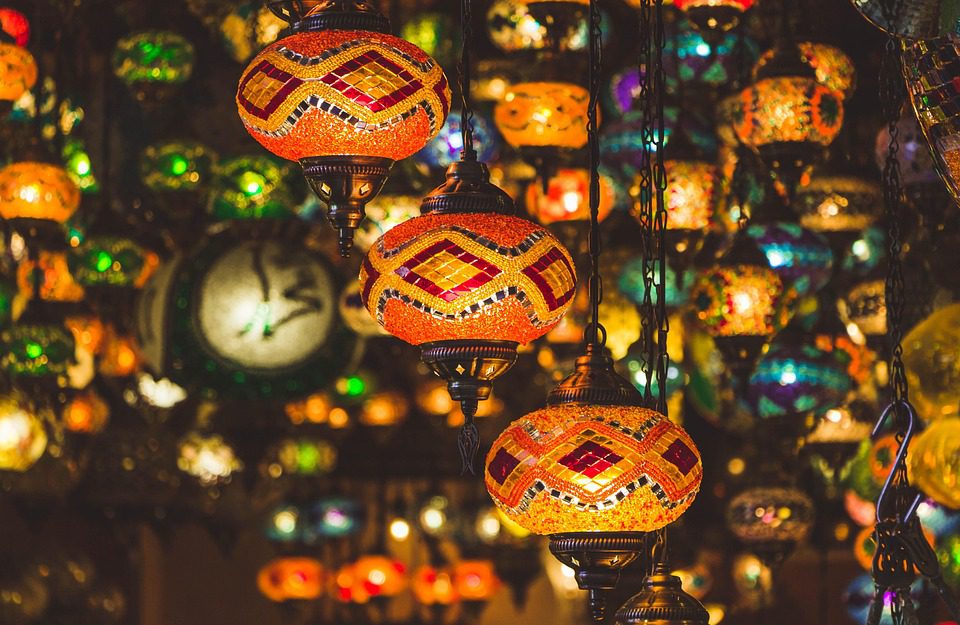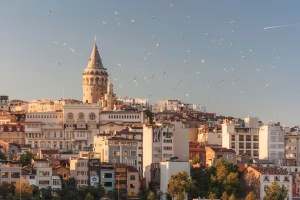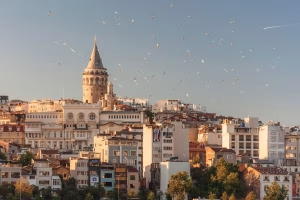Turkey comes alive in July with sun-drenched beaches, lively markets, and outdoor festivals. The country buzzes with summer energy as locals and tourists fill the coastal towns and historic cities. With temperatures climbing and the Mediterranean Sea warming to perfect swimming conditions, Turkey in July offers the quintessential summer experience.
From Istanbul’s rooftop bars to Cappadocia’s sunrise balloon rides, July transforms Turkey into an outdoor playground. This guide covers everything you need to know about visiting during this peak season from dealing with the heat to finding the best festivals and avoiding tourist crowds.
Is July a Good Time to Visit Turkey?
July ranks as Turkey’s hottest and busiest month, drawing crowds to its beaches, historic sites, and resort towns. The country experiences peak tourism during this time, with travelers from around the world flocking to its shores.
Why You Should Visit
The Aegean and Mediterranean coasts shine in July, with perfect conditions for swimming, sunbathing, and water activities. The extended daylight hours (12-14 hours daily) give you more time to explore historic sites, markets, and natural wonders without rushing.
The country’s summer infrastructure is excellent from seaside restaurants with cooling mist systems to air-conditioned museums and shopping centers where you can escape the midday sun.
Also read: Turkey With Kids: Your Complete Family Adventure Guide
What to Look Out For
Here are the top things to be aware of when planning your Turkey travel guide for July:
-
High daytime temperatures, regularly exceeding 35°C in inland cities and the southeast
-
Crowded tourist attractions, especially in Istanbul, Cappadocia, and coastal resorts
-
Higher prices for flights, accommodation, and tours due to peak season demand
-
Strong UV index requiring serious sun protection throughout the day
-
Possible water restrictions in some rural areas during dry spells
-
Mosquitoes in coastal regions, particularly around sunset
-
Conservative dress requirements for religious sites despite the heat
-
Popular restaurants and tours requiring advance reservations
-
Midday heat making sightseeing challenging between 12-3 pm
-
Occasional summer festivals causing local transport congestion
Overview of Weather in Turkey in July
July stands as Turkey’s hottest month, with clear skies and minimal rainfall across most regions. The country experiences a distinct summer pattern with regional variations in temperature and humidity.
|
Weather Parameter |
Typical Range |
|---|---|
|
Average Temperature |
28°C-40°C (82°F-104°F), hottest in southeast and inland areas |
|
Average Rainfall |
0-20 mm (very low; mostly dry conditions) |
|
Daily Wind Speed |
10-20 km/h, stronger breezes along the coasts |
|
Temperature of Sea |
23°C-28°C (Aegean & Mediterranean coasts) |
-
Humidity: Moderate to high (60-75%) along coastal regions; lower (30-40%) in central and eastern Turkey
-
Sunshine: 12-14 hours of direct sunshine daily with minimal cloud cover and intense UV radiation
Also read: Turkey on a Budget: The Ultimate Guide for Indian Travelers
Best Things To Do in Turkey in July
Explore Istanbul’s Historic Waterfront

-
Location:Sultanahmet, Eminönü, Karaköy, Ortaköy
-
Why It’s Great in July: Extended twilight hours allow for pleasant evening strolls along the Bosphorus after the day’s heat subsides
-
What to Expect:
-
Morning visits to major landmarks before crowds peak
-
Afternoon boat cruises offering cooling breezes and city views
-
Evening outdoor dining with spectacular sunset views
-
Night markets and outdoor concerts in city parks
-
Cruise the Turquoise Coast

-
Why It’s Great in July: Perfect sea conditions with calm waters, ideal visibility for swimming and marine life spotting
-
What to Expect:
-
Traditional wooden gulet cruises stopping at secluded bays
-
Crystal-clear waters perfect for snorkeling and diving
-
Fresh seafood meals prepared onboard
-
Opportunities to visit ancient coastal ruins accessible only by boat
-
Lively harbor towns with bustling night markets
-
Float Above Cappadocia at Sunrise

-
Why It’s Great in July: Clear morning skies provide optimal balloon flying conditions and spectacular photography
-
What to Expect:
-
Pre-dawn wake-up calls for the coolest flying temperatures
-
Hundreds of colorful balloons creating a magical sky spectacle
-
Bird’s-eye views of fairy chimneys and unique rock formations
-
Post-flight champagne celebrations
-
Afternoon cave explorations and underground city tours
-
Also read: Turkey Visa Rejection for Indian Nationals
Relax on Mediterranean Beaches

-
Why It’s Great in July: Perfectly warm sea temperatures and established beach infrastructure
-
What to Expect:
-
Mix of pebble and sand beaches with full facilities
-
Beach clubs offering loungers, food service, and music
-
Water sports rentals including jet skis, parasailing, and banana boats
-
Ancient ruins within walking distance of many beaches
-
Family-friendly resorts with kids’ clubs and activities
-
Explore Ancient Ruins Without Crowds

-
Why It’s Great in July: Extended summer opening hours and early morning/late afternoon visiting options
-
What to Expect:
-
Morning or evening visits to avoid midday heat
-
Dramatic lighting for photography in the golden hours
-
Nighttime performances in ancient theaters (especially Aspendos)
-
Fewer tour groups if you arrive very early or near closing
-
Knowledgeable local guides offering historical context
-
Also read: Turkey Visa Photo Size Requirement & Specification Guide
Events in Turkey in July
Festivals and celebrations in Turkey in July offer visitors a chance to experience the country’s vibrant culture alongside locals. These events showcase everything from music and arts to traditional customs and culinary specialties.
Bodrum Ballet Festival

-
Date: Mid to late July
-
Venue: Bodrum Castle and amphitheater
Set against the dramatic backdrop of Bodrum’s medieval castle, this festival presents classical and contemporary ballet performances by Turkish and international dance companies. The open-air venue creates a magical atmosphere as performances take place under the stars with the castle walls illuminated. The festival attracts dance enthusiasts from across Turkey and abroad, with performances often selling out weeks in advance.
Antalya Sand Sculpture Festival

-
Date: Throughout July (and summer months)
-
Venue: Lara Beach, Antalya
One of the world’s largest sand sculpture exhibitions takes place on Antalya’s Lara Beach, featuring massive creations by international artists. Each year follows a different theme, with sculptures reaching heights of several meters and incorporating intricate details that showcase extraordinary craftsmanship. Evening light shows transform the sculptures after dark, creating a completely different viewing experience.
Also read: Famous Restaurants in Turkey: Celebrity Chefs and Local Favorites
Things to Know Before You Visit Turkey in July
Planning how to plan a trip to Turkey in July requires preparation for the heat, crowds, and peak season logistics. These practical tips will help Indian travelers navigate summer conditions and make the most of their Turkish adventure.
-
Visa requirements are straightforward for Indian citizens. Apply online through the official e-Visa portal at least 2 weeks before travel. The process typically takes 24-48 hours, and the visa costs approximately INR 2,000.
-
The Turkish Lira (TRY) is the official currency, with 1 TRY equal to roughly 2.5-3 INR as of 2025. Turkey operates on GMT+3 time zone, which is 2.5 hours behind India.
-
Emergency contacts to save in your phone include Police (155), Ambulance (112), and Fire Department (110).
-
While English is widely spoken in tourist areas, learning basic Turkish phrases will enhance your experience and be appreciated by locals. Essential words include “Merhaba” (hello), “Teşekkürler” (thank you), and “Lütfen” (please).
-
Pack plenty of sun protection including high SPF sunscreen, sunglasses, and a wide-brimmed hat.
-
Lightweight, modest clothing is recommended, especially when visiting religious sites. Carry a reusable water bottle to stay hydrated throughout the day, and consider a portable fan for extreme heat days.
-
Cash is still king for small purchases and in rural areas, though cards are widely accepted in cities and tourist destinations. ATMs are plentiful in urban and tourist areas.
Also read: 15 Mind-Blowing Turkey Monuments Every Tourist Should See
What to Wear
-
Light, breathable fabrics like cotton, linen, and technical moisture-wicking materials
-
Modest clothing that covers shoulders and knees when visiting mosques and conservative areas
-
Comfortable walking sandals or shoes with good support for sightseeing
-
Swimwear for beaches and pools (with cover-ups for walking through hotel areas)
-
Light scarf or shawl for women to cover hair when entering mosques
What to Pack
-
High SPF (50+) sunscreen and after-sun lotion
-
Insect repellent for evenings in coastal areas
-
Reusable water bottle and portable mini-fan
-
Medications including anti-diarrhea remedies and pain relievers
-
Power adapter (Type F, European style plugs)
Transport

Turkey offers diverse transportation options for travelers, with extensive networks connecting major cities and tourist destinations.
Domestic Flights
Turkish Airlines, Pegasus, and AnadoluJet operate frequent domestic routes connecting major cities. A flight from Istanbul to Antalya takes approximately 1 hour and costs INR 3,500-7,000 depending on when you book. Airports are modern and efficient, with most offering free WiFi and good food options.
High-Speed Trains
Turkey’s expanding high-speed rail network connects Istanbul, Ankara, Konya, and several other cities. The Istanbul-Ankara route takes about 4.5 hours and offers comfortable seating, onboard food service, and beautiful scenery. Tickets cost approximately INR 1,200-2,500 and should be booked in advance during summer months.
Intercity Buses
Turkey’s extensive bus network reaches virtually every town and city. Major companies like Kamil Koç and Metro Turizm offer comfortable coaches with reclining seats, personal entertainment screens, and onboard refreshments. Buses between major cities run frequently, with Istanbul to Cappadocia taking approximately 10-12 hours and costing INR 1,000-1,800.
Car Rentals
Renting a car gives you flexibility to explore at your own pace. Major international and local companies operate at airports and city centers. Expect to pay INR 2,500-4,000 per day for a compact car. An international driving permit is recommended alongside your Indian license.
City Public Transport
Istanbul has an extensive network of metros, trams, buses, and ferries connected by the Istanbul Kart payment system. Antalya, Izmir, and other major cities also offer efficient public transportation options. Day passes in Istanbul cost approximately INR 300-400 and offer unlimited trips.
Also read: Remarkable Churches in Turkey Every Traveler Should Visit
Where to Stay
Turkey offers accommodation options for every budget, from backpacker hostels to ultra-luxury resorts. July is high season, so booking 2-3 months in advance is strongly recommended, especially for coastal areas and popular destinations.
Budget Hotels:
-
Cheers Hostel
-
Location: Alemdar Mahallesi, Zeynep Sultan Camii Sk. No:21, 34110 Fatih/İstanbul, Turkey
-
Website:http://www.cheershostel.com/
-
Price Range: INR 1,800-2,500/night
-
-
Sato Cave Hotel
-
Location: Orta Mah. Konak Sok. No:7, 50180 Göreme/Nevşehir, Turkey
-
Website:http://www.satocavehotel.com
-
Price Range: INR 2,500-3,500/night
-
Mid-range Hotels:
-
Hotel Amira Istanbul
-
Location: Kucuk Ayasofya Mahallesi, Mustafa Pasa Sokak No:43, 34122 Fatih/İstanbul, Turkey
-
Website:http://www.hotelamira.com/
-
Price Range: INR 7,000-9,000/night
-
-
Kale Konak Cappadocia
-
Location: Kale Sokak No:9, 50240 Uçhisar/Nevşehir, Turkey
-
Website:http://www.kalekonak.com/
-
Price Range: INR 8,000-10,000/night
-
Luxury Hotels:
-
Four Seasons Hotel Istanbul at Sultanahmet
-
Location: Tevkifhane Sokak No:1, 34110 Sultanahmet, Istanbul, Turkey
-
Price Range: INR 30,000-45,000/night
-
-
D Maris Bay
-
Location: Datça Yolu 35. Km, 48700 Marmaris/Muğla, Turkey
-
Website:https://www.dmarisbay.com/
-
Price Range: INR 45,000-70,000/night
-
Also read: 20 Unique Facts About Turkey You Won’t Believe
What to Eat

Turkish cuisine shines in summer with fresh produce and outdoor dining options. July brings seasonal specialties and the pleasure of eating al fresco in the warm evenings.
-
Kebabs in various forms (try at Zübeyir Ocakbaşı in Istanbul, where chefs grill meat over open flames right in front of you)
-
Meze platters featuring seasonal vegetables and herbs (sample at Ciya Sofrasi in Kadıköy, Istanbul)
-
Balık ekmek (fish sandwich) freshly prepared along the waterfront (best at Eminönü Balıkçısı stalls in Istanbul)
-
Gözleme (Turkish pancake) with cheese and spinach (find at local markets in Göreme, Cappadocia)
-
Dondurma (stretchy Turkish ice cream) to beat the heat (available at Mado shops throughout Turkey)
-
Seasonal fruits including figs, watermelon, and cherries from local markets
Why Choose OneVasco?
OneVasco makes visa applications effortless. Our expert team manages the entire process, allowing you to focus on your journey.
Enjoy stress-free travel with fast visa approvals
-
Expert and Personalized Support
-
Efficient and Hassle-Free Process
-
Real-Time Tracking and Updates
-
Transparent Communication
-
Trusted by Millions
FAQs
Is July a Good Time to Visit Turkey?
July offers perfect weather for beaches, swimming, and outdoor activities. It’s ideal if you enjoy vibrant atmosphere and don’t mind heat and crowds. For a more budget-friendly visit with milder temperatures, consider May, June, or September.
How Hot Is Turkey in July?
Coastal cities like Istanbul, Bodrum, and Antalya average 28-34°C during the day and 22-25°C at night. Inland areas such as Cappadocia and Ankara can reach 35-40°C during peak daytime hours but cool down significantly in the evenings.
What Is the Average Temperature in Turkey in July?
The nationwide average sits between 28-35°C during daytime hours. Coastal regions benefit from sea breezes, while inland areas experience more extreme temperature variations between day and night.
Can I Do Sightseeing in Turkey in July?
Yes, but plan your schedule strategically. Visit outdoor attractions like ancient ruins and markets in the early morning (7-10 AM) or late afternoon (4-7 PM). Spend midday hours in air-conditioned museums, shopping centers, or enjoying a long lunch in shaded restaurants.
What to Wear in Turkey in July?
Light, breathable clothing is essential. Pack modest options for visiting religious sites (covering shoulders and knees), casual resort wear for coastal areas, and comfortable walking shoes. Always carry a hat, sunglasses, and light scarf.
Are Tourist Attractions Open in Turkey in July?
Most attractions operate on extended summer hours, often opening earlier and closing later than in winter months. Some historical sites may close during the hottest midday hours (12-2 PM). Always check official websites for current hours.
Is It Safe to Travel to Turkey in July?
Generally yes, with normal travel precautions. The biggest safety concerns in July are heat-related (dehydration, sunburn) and petty theft in crowded tourist areas. Stay hydrated, use sun protection, and keep valuables secure.
How to Plan a Turkey Trip in July?
Book accommodation and flights 2-3 months in advance for best availability and prices. Create an itinerary that alternates between beach days and city exploration. Schedule outdoor activities for mornings and evenings, with indoor or water-based activities during peak heat hours.
What Are the Best Places to Visit in Turkey in July?
The most rewarding tourist spots in Turkey in July include Istanbul for culture and nightlife, Cappadocia for unique landscapes and balloon rides, Antalya and Bodrum for beaches and resorts, Ephesus for remarkable ancient ruins, and the Turquoise Coast for sailing and swimming in perfect Turkey in July conditions.




















